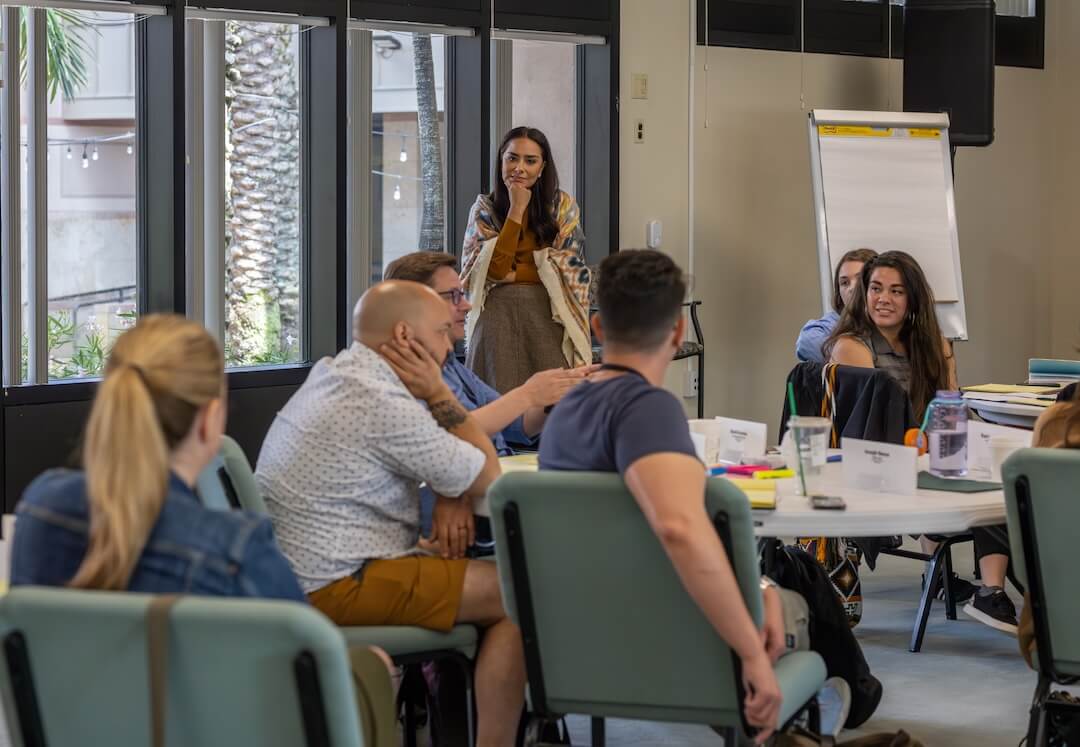SARAJEVO, Bosnia and Herzegovina — From Ukraine to Gaza, the past few years have seen simmering hostilities explode into all-out wars, making 2024 one of the most conflict-ridden years since World War II. Those conflicts have not only brought a surge of misinformation, but they have also created major logistical challenges for fact-checkers.
Panelists from Sudan, Ukraine, Lebanon, Iraq and the West Bank shared personal experiences and advice in navigating those challenges Wednesday at GlobalFact 11, an annual fact-checking conference hosted by Poynter’s International Fact-Checking Network held this year in Sarajevo. Keeping fact-checkers safe during wartime was one of the biggest concerns.
In Ukraine, every family has suffered during the war against Russia, whether it be the loss of relatives on the front line, the loss of communications with friends, or the loss of homes from being forced to flee, said VoxUkraine deputy executive director Svitlana Slipchenko: “We, as fact-checkers, suffer from all the same things.”
“Sometimes while monitoring Russian disinformation, we see even wishes to Ukrainians to die from another Russian missile or drone.”
Fact-checking organizations should have staff evacuation plans ready, Slipchenko said. While training local journalists in Kyiv, her team made sure sessions took place in sheltered areas and reminded participants to ask each other for permission before taking photos. Her organization is also planning first aid training for employees to prepare them for medical emergencies.
Organizations must also protect their staff’s mental health. Fact-checkers in active conflict zones operate under extreme stress, and even fact-checkers working remotely encounter traumatizing content while doing their work.
“With more than 150 journalists killed since Oct. 7, being a journalist is like being a target,” said Riham Abu Aita, the co-founder of the Palestinian Platform for Fact-Checking and Media Literacy-Kashif. “You are the target.”
Propaganda proliferates during war, and getting accurate information can be difficult in situations where fact-checkers cannot work on the ground, or they face breakdowns in communication infrastructure.
Aws Al-Saadi, the founder and president of fact-checking platform Tech4Peace, said that in 2014, when ISIS entered Iraq, the government blocked access to social media. As fact-checkers attempted to circumvent the ban, the government continued to block websites. In 2019, the government shut down the internet following a demonstration.

Istinomjer co-creator Tijana Cvjetićanin, left, and Tech4Peace founder and president speak as part of a panel discussed called “Fact-Checking During War” at GlobalFact 11 in Sarajevo, Bosnia-Herzegovina. (Photo: Vanja Čerimagić)
Al-Saadi, who was based in Baghdad, moved to Kurdistan, a region that still had internet access. His organization brought in SIM cards from Turkey and outside Baghdad to transmit information. Large files that could not be transferred using roaming data, such as videos and photos, had to be physically transported: “We had a taxi driver every day going with a hard disk between Baghdad and Kurdistan.”
During wartime, governments may try to keep the public’s focus on the conflict, allowing them to quietly escape scrutiny in other policy areas, warned Maharat Foundation program manager Layal Bahnam. Fact-checkers must continue to play their watchdog roles even as they debunk wartime mis- and disinformation, she said.
Panelists urged fact-checkers in conflict-prone areas to plan ahead. Organizations should have power banks or generators ready for electricity and supply shortages, Slipchenko said. They should also make contingency plans with journalists outside the conflict zone to ensure coverage doesn’t lapse.
Beam Reports cofounder Raghdan Orsud said that during the 2021 coup in Sudan, she was the only staff member outside the country. She credited the organization’s survival to an Egyptian fact-checking outlet that reached out and offered to help with reporting.
“If at all possible, try to get registered somewhere else,” Orsud said. “Because while my team was trying to flee an actual war, along with my family as well, I was literally trying to find a country where we can operate from to continue.”
Failing to build an “agile operation” ahead of time, Orsud warned, will mean having to do it while living through a crisis.







